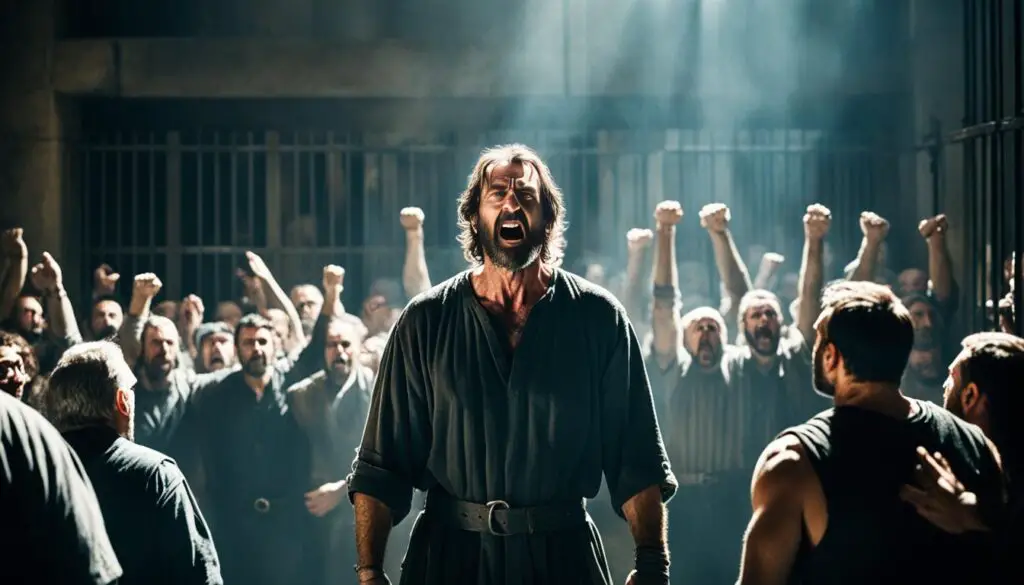Barabbas, a Biblical character mentioned in the New Testament, plays a significant role in the story of Jesus’ trial and crucifixion. He was a murderer who faced a death sentence but was released instead of Jesus. Understanding Barabbas’ story and the reasons behind his release provides insights into the Passion of Christ and the concept of salvation.
Key Takeaways
- Barabbas was a Biblical character mentioned in the New Testament, known for his role in Jesus’ trial and crucifixion.
- He was a convicted murderer who faced a death sentence.
- Barabbas was released instead of Jesus, highlighting the significance of Jesus’ sacrifice.
- The story of Barabbas provides insights into the concept of salvation through Jesus’ crucifixion.
- Understanding Barabbas’ story helps us reflect on the human inclination towards worldly solutions rather than seeking true redemption.
Barabbas in the Gospels
Barabbas is mentioned in the Gospels, specifically in Matthew 27:16, Mark 15:7, Luke 23:18, and John 18:40. These passages shed light on his reputation as a notorious prisoner and a robber. The Jewish people fervently pleaded for the release of Barabbas instead of Jesus, highlighting his significant presence in the biblical narrative.
In Matthew 27:16, Barabbas is described as a well-known prisoner alongside Jesus during Pilate’s trial. The crowd, incited by the religious leaders, demands the release of Barabbas and the crucifixion of Jesus. Mark 15:7 reinforces this scenario, emphasizing that Barabbas was part of an insurrectionist group and had committed murder during the rebellion. Luke 23:18 further emphasizes Barabbas’ crimes, mentioning that he had been imprisoned due to a recent uprising in the city and was a dangerous man. Lastly, John 18:40 highlights Pilate’s attempt to release Jesus, but the crowd overwhelmingly chooses Barabbas, underscoring his notorious reputation.
“Now Barabbas was a robber.” – John 18:40 (ESV)
The Gospels depict Barabbas as a prominent figure in Jesus’ trial and subsequent crucifixion. His name resonates with infamy and stands as a stark contrast to the innocent Savior. The choice between Barabbas and Jesus reflects the moral dilemma faced by the people and presents a poignant narrative within the biblical scriptures.
The Roles of Barabbas in the Gospels
| Gospel | Chapter and Verse | Description |
|---|---|---|
| Matthew | 27:16 | Barabbas mentioned as a notorious prisoner alongside Jesus during Pilate’s trial. |
| Mark | 15:7 | Describes Barabbas as an insurrectionist and murderer, highlighting his presence during Jesus’ trial. |
| Luke | 23:18 | Barabbas described as a dangerous man involved in an uprising in the city. |
| John | 18:40 | Pilate attempts to release Jesus, but the crowd demands the freedom of Barabbas. |
Barabbas’ portrayal in the Gospels presents a compelling narrative that showcases the tension between the guilty and the innocent. As the Gospels unfold, they reveal the significance of Barabbas’ presence and the profound impact of the people’s choice.
Historical Evidence of Barabbas
While the existence of Barabbas as a historical figure is not explicitly confirmed by external sources, there are certain historical and biblical clues that provide insights into his existence.
Firstly, the mention of Barabbas in the New Testament Gospels indicates that he was a well-known figure during that time. He is referenced in Matthew 27:16, Mark 15:7, Luke 23:18, and John 18:40, highlighting his significance in the biblical narrative surrounding Jesus’ trial and crucifixion.
Furthermore, the Roman prefect Pilate, who appears in historical records, is directly associated with Barabbas and Jesus’ trial. Pilate’s role in the release of Barabbas is mentioned in the Gospels, emphasizing the historical context of Barabbas’ existence.
Although there are no specific Roman records or physical manuscripts outside of the Bible that explicitly mention Barabbas, it is important to consider that such documentation may not have survived or been preserved. The absence of these records does not negate Barabbas’ existence, especially considering that the Gospel authors included him in their accounts due to his well-known status at the time.

Barabbas’ Crime and Release
The story of Barabbas in the Bible provides varying accounts of his crime, with some indicating murder, robbery, or participation in a revolt. While the exact details may be debated, what remains clear is that Barabbas had rebelled against the Roman Empire, as crucifixions were reserved for those who committed crimes against Rome.
During the Passover, it was a Jewish tradition for Pilate to release a prisoner of the crowd’s choosing. Pilate’s choice presented the Jewish people with a decision: to release either Barabbas or Jesus, who had been accused of blasphemy and sedition by the religious leaders.
Influenced by the religious leaders, the crowd chose to set Barabbas free. This choice reflects the manipulation of the people’s preferences and highlights the power of influential figures in shaping decisions during this historical event.
The release of Barabbas marked a pivotal moment in the Passion of Christ, leading to Jesus’ crucifixion and ultimately his sacrifice for the salvation of humanity.
In this act, the significance of Barabbas’ crime and subsequent release becomes intertwined with the deeper narrative of salvation and redemption through Jesus.

| Barabbas’ Crime: | Release: | Jewish Tradition: |
|---|---|---|
| Indications of murder, robbery, or participation in a revolt | Chosen to be released instead of Jesus | Pilate’s Passover tradition |
Reasons for Choosing Barabbas
The decision to choose Barabbas over Jesus can be attributed to several factors, including the influence of religious leaders, crowd manipulation, and the appeal of insurrectionist ideas.
The religious leaders played a crucial role in manipulating the crowd’s perception of Barabbas and Jesus. Through false witnesses and conflicting accounts, they painted a negative image of Jesus, portraying him as a dangerous threat to society. This manipulation swayed the crowd towards choosing Barabbas, who was seen as a lesser evil compared to Jesus.
The people’s decision to release Barabbas may have also been influenced by their desire for salvation through rebellion against Rome. Barabbas, as an insurrectionist leader, embodied the hopes and aspirations of those who sought to overthrow the oppressive Roman regime. By choosing Barabbas, the crowd believed they were aligning themselves with a figure who would fight for their freedom and independence.
“It is better to trust in the Lord than to put confidence in princes.” – Psalm 118:9
This misguided decision reflects a misunderstanding of Jesus’ mission and a preference for worldly solutions over spiritual redemption. The people failed to recognize that Jesus’ purpose was not to incite rebellion against Rome but to offer salvation through love, forgiveness, and the establishment of God’s kingdom.
By embracing Barabbas and rejecting Jesus, the crowd demonstrated a lack of faith in the transformative power of love and a reliance on human efforts to bring about change. They sought immediate and tangible liberation from Rome, disregarding the eternal freedom and spiritual redemption that Jesus offered.
Comparing Barabbas and Jesus
| Barabbas | Jesus |
|---|---|
| Insurrectionist leader | Messiah and Savior |
| Represented rebellion against Rome | Preached love, forgiveness, and God’s kingdom |
| Temporary solution | Lasting solution |
| Engaged in violence and murder | Sacrificed himself for the sins of humanity |
The table above highlights the stark contrast between Barabbas and Jesus. While Barabbas represented a temporary and worldly solution, Jesus offered a lasting and spiritual solution to the human condition. Choosing Barabbas over Jesus was a reflection of the crowd’s misplaced priorities and failure to recognize the true source of redemption and freedom.

Barabbas vs. Jesus as Symbols
Barabbas and Jesus are powerful symbols in the biblical narrative, representing contrasting ideas of temporary and lasting solutions, redemption, and salvation. Barabbas emerges as a symbol of a temporary solution, while Jesus offers a lasting solution.
Barabbas symbolizes the Jews’ desire for liberation from Roman oppression. As a rebel and murderer, his actions represented a temporary fix to their longing for freedom. However, Barabbas’ release did not bring about lasting change or address the root causes of their hardships.
On the other hand, Jesus embodies a lasting solution through his sacrifice on the cross. His death and resurrection provide salvation and redemption from sin, offering a path to eternal life. Jesus’ message of love, forgiveness, and transformation speaks to the deepest needs of humanity.
“For God so loved the world that he gave his one and only Son, that whoever believes in him shall not perish but have eternal life.” – John 3:16
The choice between Barabbas and Jesus serves as a profound reminder to prioritize true salvation through Jesus over pursuing temporary worldly solutions. While Barabbas represented a limited and flawed human alternative, Jesus offers the opportunity for genuine redemption, forgiveness, and eternal life.

By embracing the message of Jesus, individuals can experience true freedom and find lasting solutions to the challenges they face. It is through faith in Jesus and his redemptive work that one can find ultimate deliverance from sin and experience eternal salvation.
Conclusion
The story of Barabbas in the Bible carries immense significance and sheds light on various aspects of human nature. It serves as a powerful reminder of our inherent sinfulness and our inclination towards seeking worldly solutions. However, it also highlights the ultimate source of true freedom – Jesus.
Barabbas’ release, chosen by the Jewish people, illustrates our inability to save ourselves from the bondage of sin and its consequences. We are reminded that no amount of rebellion or reliance on human efforts can offer lasting liberation. Instead, our true freedom lies in wholeheartedly embracing Jesus as our Savior, who possesses the power to release us from the chains of sin.
Through His sacrifice on the cross, Jesus provides the way to redemption and salvation. He offers a solution that transcends the temporary fixes offered by individuals like Barabbas. By relying on Jesus’ power and grace, we can experience true freedom, emancipation from the guilt and consequences of our sins, and a restored relationship with our Creator.
FAQ
Who is Barabbas in the Bible?
Barabbas is an enigmatic figure in the Bible who shares similarities with Jesus. He is mentioned in the Gospels, particularly in Matthew 27:16, Mark 15:7, Luke 23:18, and John 18:40.
What was Barabbas’ role during Jesus’ trial and crucifixion?
Barabbas played a significant role during Jesus’ trial and crucifixion. He was a notorious prisoner and a robber, and the Jewish people pleaded for his release instead of Jesus.
Is there historical evidence of Barabbas’ existence?
While there is no external historical evidence specifically confirming Barabbas’ existence, the fact that he is mentioned in the Bible and connected to historical figures like Pilate suggests that he was well-known at the time.
What crimes did Barabbas commit?
The Gospels provide varying accounts of Barabbas’ crime, with some indicating murder, robbery, or participation in a revolt. It is clear, however, that he had rebelled against the Roman Empire, as crucifixion was reserved for those who committed crimes against Rome.
Why did the Jewish people choose to set Barabbas free instead of Jesus?
The Jewish people chose to set Barabbas free instead of Jesus due to the influence of the religious leaders, who manipulated the crowd through false witnesses, conflicting accounts, and an illegal trial. They may have desired an insurrectionist leader like Barabbas to overthrow the Romans.
What do Barabbas and Jesus symbolize?
Barabbas symbolizes a temporary solution to the Jews’ desire for liberation from Roman oppression. Jesus, on the other hand, represents a lasting solution through his sacrifice on the cross, which provides salvation and redemption from sin.
What is the significance of Barabbas in the Bible?
The story of Barabbas in the Bible highlights human sinfulness, the desire for worldly solutions, and the need for true freedom through Jesus. Barabbas’ release serves as a reminder that we cannot save ourselves from sin and its effects, but instead, we must rely on the power of Jesus, the true savior, to offer us lasting freedom.







